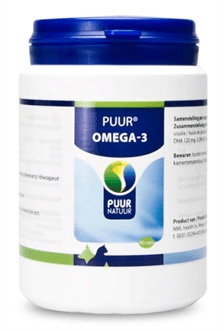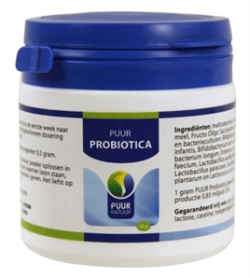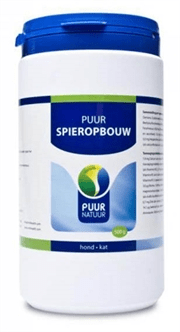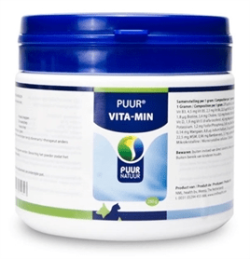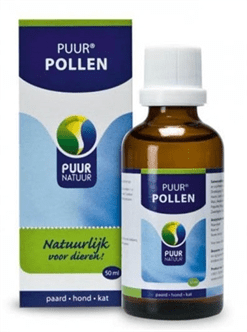Pure Omega-3 90 capsules
Pure Omega-3 90 capsules
For smooth movement. For a healthy skin and coat. For the heart. With hypersensitivities. For healthy intestines. For the immune system. For mental health.
Suitable for: Human, Cat, Dog, Rodent, Horse, Pony, Bird
Indication(s):
For smooth movement.
For a healthy skin and coat.
Good for the heart. With hypersensitivities.
For healthy intestines.
For the immune system.
For mental health.
For severe shedding or red skin.
As a standard supplement to the diet to maintain a healthy skin and coat condition.
Administration directly into the beak/mouth or through the food.
Analysis:
(per capsule) fish oil 1000 mg of which EPA 180 mg and DHA 120 mg. 0.3 % Vitamin E (d-alpha-tocopherol).
Properties per ingredient: The polyunsaturated fatty acids can be divided into two large families: the omega-3 family (alpha-linolenic acid group) and the omega-6 family (linoleic acid group).
Because the animal body cannot produce these fatty acids itself, omega-3 and omega-6 fatty acids must be obtained through the feed or supplementation. These essential fatty acids used to be called vitamin F.
In the twentieth century, the ratio between omega-3 and omega-6 fatty acids in the diet has shifted strongly in the direction of omega-6 fatty acids.
The increasing use of vegetable oils and fats, which are rich in omega-6 fatty acids, stimulates the formation of arachidonic acid at the expense of EPA and DHA. Arachidonic acid itself is abundant in the Western diet.
It is estimated that the ratio of omega-6 to omega-3 fatty acids in the Western diet is about 20-25:1. Researchers state that a ratio of about 5:1 is more desirable.
From an evolutionary point of view, the dog (and its predecessors) consumed omega-6 and omega-3 in a ratio of (probably) 1:1 for millions of years.
The enzyme delta-6-desaturase regulates both the conversion of linoleic acid to DGLA and the conversion of ALA to (ultimately) EPA.
With an excess of linoleic acid, this means that ALA can hardly use the enzyme anymore, so that hardly any more EPA and DHA are formed.
This enzyme is already the slowest step in the chain and the functioning of this enzyme is also inhibited by many factors in the diet (including trans fatty acids, saturated fats, deficiencies of zinc, magnesium and/or vitamin B6, alcohol) and metabolic factors (hyper-cholesterolemia, diabetes, certain medications).
As a result, many animals in our Western society can hardly form GLA and EPA themselves, and that these fatty acids must therefore be supplied through the diet.
Dosage and Application:
Unless the doctor or therapist prescribes otherwise.
The optimal dose 1 x daily: (Build up the dose slowly).
- Dog 1 – 3 capsule(s)
- Cat 1 – 2 capsule(s)
Advice for use In an acute situation, the dose may be increased on the advice of a veterinarian. When Omega-3 oil is administered, loose stools may occur in the beginning. Build up slowly if necessary.
Treatment duration
Omega-3 fatty acids are built into cell membranes. This is a process of several days to 2 weeks. The effect is usually visible after 1 to 3 weeks. After the symptoms have subsided, you can switch to a maintenance dose.
This is usually half the dosage indicated on the packaging. When dosing this product, carefully observe the reaction of the animal. A higher dose may be required in the beginning, this product can be safely given in a double dose.
Reduce the dose gradually when the complaints diminish or have disappeared to the lowest possible dose. This product can be given permanently in case of chronic complaints.
Save
Store in the refrigerator after opening. The effectiveness of the polyunsaturated fatty acids can decrease under the influence of light and oxygen. Keep out of reach of children.
Synergy and combinations with other products
This product can be used without objection in combination with other natural health products and regular medicines.
Contraindications
There are no known contraindications in the indicated dosage.
Side effects
When using high doses of fish oil (more than 5 grams of EPA + DHA per day) there is a risk of loose stools.
Interactions
Because omega-3 fatty acids have the ability to prevent blood clotting, animals taking blood thinners, deficient in vitamin K or taking other drugs that inhibit blood clotting (aspirin) can cause internal bleeding when using high doses of omega-3 fatty acids ( more than 5 grams of EPA + DHA).
In those cases it is recommended to adjust the dose. The effect on blood clotting by omega-3 fatty acids is maximal after 6 weeks of treatment.
Contents: 90 capsules
